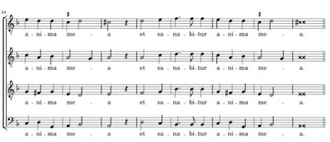Gospel in Art: I am not worthy to have you under my roof

Tomás Luis de Victoria, Domine non sum dignus
Source: Christian Art
Gospel of 12 September 2022
Luke 7:1-10
When Jesus had come to the end of all he wanted the people to hear, he went into Capernaum. A centurion there had a servant, a favourite of his, who was sick and near death. Having heard about Jesus he sent some Jewish elders to him to ask him to come and heal his servant. When they came to Jesus they pleaded earnestly with him. 'He deserves this of you' they said 'because he is friendly towards our people; in fact, he is the one who built the synagogue.' So Jesus went with them, and was not very far from the house when the centurion sent word to him by some friends: 'Sir,' he said 'do not put yourself to trouble; because I am not worthy to have you under my roof; and for this same reason I did not presume to come to you myself; but give the word and let my servant be cured. For I am under authority myself, and have soldiers under me; and I say to one man: Go, and he goes; to another: Come here, and he comes; to my servant: Do this, and he does it.' When Jesus heard these words he was astonished at him and, turning round, said to the crowd following him, 'I tell you, not even in Israel have I found faith like this.' And when the messengers got back to the house they found the servant in perfect health.
Click here to watch the video -- watch the first 1:36
Reflection on the music
"Lord, I am not worthy that you should enter under my roof." Those words that the centurion addressed to Jesus are very familiar indeed, as we say them every time we attend Mass, just before receiving Holy Communion. The Latin version of this text was set to music for men's voices by the 16th-century Spanish priest-composer Tomas Luis de Victoria. There's one slight difference in the text, though: the centurion says "my servant will be healed", but Victoria uses the text that has found its way into the Mass "my soul will be healed". When we pray this text, we're not simply quoting something the centurion said, we're applying it to ourselves. Those closing words are given special emphasis in Victoria's setting, as all four voices move together in block chords, in contrast to the free-flowing counterpoint of the earlier music.
The centurion shows a remarkable combination of faith and humility when he asks Jesus to heal his servant. He doesn't want Jesus to go to the trouble of visiting his home, but he believes Jesus can heal his servant simply by issuing a command, much as the centurion does in his professional life. Jesus pays tribute to the centurion's deep faith - all the more remarkable as the centurion was a Gentile, not a member of the people of Israel.
When we approach Jesus, and especially when we approach the altar to receive Holy Communion, we need to adopt the same attitude that the centurion had: even though we are unworthy to encounter Jesus, he still wants to come to us, and so he heals us, he makes us worthy. All he need do is "say the word".
Reflection written by Monsignor Philip Whitmore. He is the parish priest of St James' Church, Spanish Place, in central London. Previously he lived for over 20 years in Rome, working first in the Vatican and then as Rector of the Venerable English College. Before becoming a priest, he was a music historian based at Magdalen College, Oxford.
LINKS
Gospel in Art: https://christian.art/
Todays reflection: https://christian.art/daily-gospel-reading/luke-7-1-10-2022/
Watch a video recording of the talk Deacon Patrick gave on 11 September at St Mary's, Hampstead: www.churchservices.tv/hampstead/archive/recordings/3Eu6yF0Z7bacmV4


















